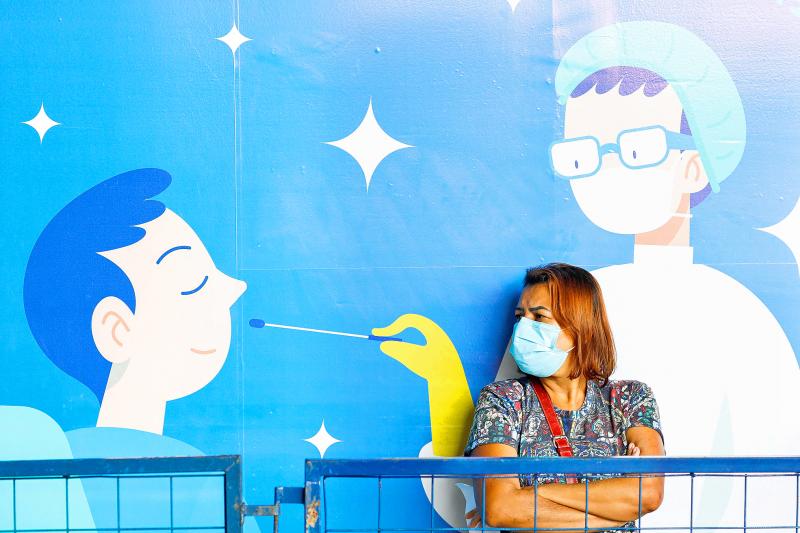The total number of COVID-19 cases registered worldwide on Friday passed 300 million, with the Omicron variant of SARS-CoV-2’s rapid spread setting new infection records in dozens of countries over the past week.
Thirty-four countries have in the past seven days recorded their highest number of weekly cases since the start of the COVID-19 pandemic, including 18 nations in Europe and seven in Africa, according to an Agence France-Presse count based on official figures.
While far more contagious than previous variants, Omicron appears to cause less severe illness than its predecessors.

Photo: AFP
Even as it spurred the world to a record 13.5 million cases in the past week alone — 64 percent higher than the previous seven days — the global average of deaths dropped 3 percent.
France’s public health authority on Friday said that the risk of hospitalization was about 70 percent lower for Omicron, citing data from Canada, Israel, the UK and the US.
However with a global average of 2 million new cases being detected daily, experts have said that that the sheer numbers threaten to overwhelm health systems.
WHO Director-General Tedros Adhanom Ghebreyesus said that Omicron should not be categorized as mild, as it “is hospitalizing people and it is killing people.”
“In fact, the tsunami of cases is so huge and quick, that it is overwhelming health systems around the world,” he said.
Omicron’s dizzying spread since being detected six weeks ago has prompted many nations to push harder for more vaccinations and some to clamp down with restrictions.
German Chancellor Olaf Scholz said that access to the country’s bars and restaurants would be limited to those who are fully vaccinated or have recovered from the virus and can also provide a negative test result.
However, people who have received a booster shot would be exempted from the test requirement.
In Austria, Chancellor Karl Nehammer tested positive for COVID-19.
“No cause for worry, I’m fine,” he said. “I continue to plead: Get vaccinated.”
As cases skyrocket in the US — which also broke its daily caseload record this week — US President Joe Biden said that COVID-19 “as we are dealing with it now is not here to stay ... but having COVID in the environment — here and in the world — is probably here to stay.”
In India, Omicron-led rising case numbers have brought fears of a return to the country’s darkest pandemic days last year, when thousands were dying of COVID-19 every day.
Gautam Menon, a professor of physics and biology at India’s Ashoka University who has worked on COVID-19 infection modeling, said that “this could potentially stress out healthcare systems to levels comparable to or worse than the second wave.”
However, Kolkata’s High Court rejected a bid to cancel a major Hindu festival, despite fears the virus could spread rapidly among the 500,000 expected attendees.
“People from all states in the country will attend the religious festival and take a holy dip,” environmentalist Subhash Dutta said. “They may carry variant viruses and this religious festival may end up being the biggest superspreader in the coming days.”

Seventy percent of middle and elementary schools now conduct English classes entirely in English, the Ministry of Education said, as it encourages schools nationwide to adopt this practice Minister of Education (MOE) Cheng Ying-yao (鄭英耀) is scheduled to present a report on the government’s bilingual education policy to the Legislative Yuan’s Education and Culture Committee today. The report would outline strategies aimed at expanding access to education, reducing regional disparities and improving talent cultivation. Implementation of bilingual education policies has varied across local governments, occasionally drawing public criticism. For example, some schools have required teachers of non-English subjects to pass English proficiency

‘FORM OF PROTEST’: The German Institute Taipei said it was ‘shocked’ to see Nazi symbolism used in connection with political aims as it condemned the incident Sung Chien-liang (宋建樑), who led efforts to recall Democratic Progressive Party (DPP) Legislator Lee Kun-cheng (李坤城), was released on bail of NT$80,000 yesterday amid an outcry over a Nazi armband he wore to questioning the night before. Sung arrived at the New Taipei City District Prosecutors’ Office for questioning in a recall petition forgery case on Tuesday night wearing a red armband bearing a swastika, carrying a copy of Adolf Hitler’s Mein Kampf and giving a Nazi salute. Sung left the building at 1:15am without the armband and apparently covering the book with a coat. This is a serious international scandal and Chinese

TRADE: The premier pledged safeguards on ‘Made in Taiwan’ labeling, anti-dumping measures and stricter export controls to strengthen its position in trade talks Products labeled “made in Taiwan” must be genuinely made in Taiwan, Premier Cho Jung-tai (卓榮泰) said yesterday, vowing to enforce strict safeguards against “origin laundering” and initiate anti-dumping investigations to prevent China dumping its products in Taiwan. Cho made the remarks in a discussion session with representatives from industries in Kaohsiung. In response to the US government’s recent announcement of “reciprocal” tariffs on its trading partners, President William Lai (賴清德) and Cho last week began a series of consultations with industry leaders nationwide to gather feedback and address concerns. Taiwanese and US officials held a videoconference on Friday evening to discuss the

PERSONAL DATA: The implicated KMT members allegedly compiled their petitions by copying names from party lists without the consent of the people concerned Judicial authorities searched six locations yesterday and questioned six people, including one elderly Chinese Nationalist Party (KMT) member and five KMT Youth League associates, about alleged signature forgery and fraud relating to their recall efforts against two Democratic Progressive Party (DPP) legislators. After launching a probe into alleged signature forgery and related fraud in the KMT’s recall effort, prosecutors received a number of complaints, including about one petition that had 1,748 signatures of voters whose family members said they had already passed away, and also voters who said they did not approve the use of their name, Taipei Deputy Chief Prosecutor